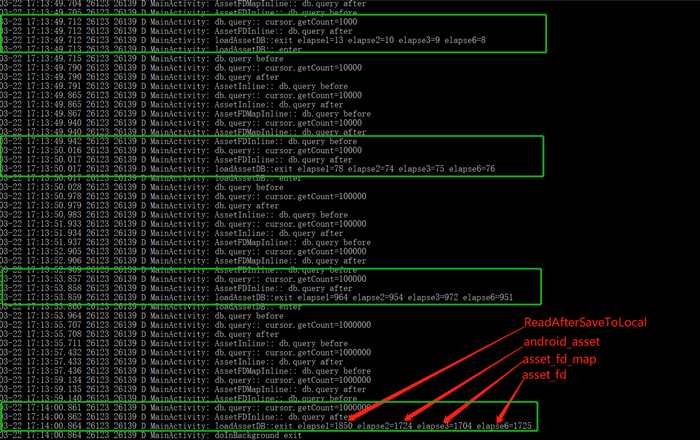Download app-release.7z
Download SQLiteXTest.7z
Introduction
Improve the SQLite file handling performance from Android Asset Resource
Background
- Android SQLiteDatabase
- Android Asset Handling
- SQLite VFS
- SQLite URI
Using the code
Generally speaking, if we want to read a SQLite database from an Android asset file we have to copy the asset file to a local folder, then read the database from the local file.
This method has some disadvantages:
- wastes disk usage
if the database file size is a little big - wastes CPU
- security vulnerable
user can replace the local database file after root the device
To overcome these disadvantages we will implment a new SQLite VFS which supports Android asset resource.
SQLite use the unix-vfs on Unix OS and use win32-vfs on Window OS
Android wraps the SQLite code and export some java interface (android.database.sqlite.SQLiteDatabase), but miss some advanced features from the original SQLite implementation
- Custom Function
- Encryption
- URI file syntax
- VFS
Actually Android have already includes the above feature in libsqlite.so, but doesn't supply the Java interface/entrypoint, and according to
Android O+ security behavior change, the developer MUST NOT access the libsqlite.so in the latter Android version
Fortunately, the SQLite developers already supply a similar Java wrapper: SQLite Android Bindings, which can supply these features
The class name and members name are mostly identical , so you can import the aar and change your java source import from
import android.database.sqlite.SQLiteDatabase;
to
import org.sqlite.database.sqlite.SQLiteDatabase;
Steps to use
- disable the compress for the SQLiteDatabase file in android asset
in build.gradle:
aaptOptions {
noCompress 'db'
}
- implement SQLite VFS and register it
sqlite3_vfs_register(&AndroidAsset::vfs, false);
sqlite3_vfs_register(&AssetFDMap::vfs, false);
sqlite3_vfs_register(&AssetFD::vfs, false);
- open the database file in asset folder with custome URI
I implement three VFSes for different scenerio
First VFS :android_asset
Java (open SQLiteDatabase with custom SQLite URI):
try (SQLiteDatabase db = SQLiteDatabase.openDatabase("file:asset_db.db?vfs=android_asset&immutable=1&mode=ro", null, SQLiteDatabase.OPEN_READONLY)) {
................................
}
Native:
static int xRead(sqlite3_file *file, void *buf, int iAmt, sqlite3_int64 iOfst) {
vfs_file *f = (vfs_file *) file;
int expectReadLen = (iAmt + iOfst > f->length) ? (f->length - iOfst) : iAmt;
int readLen = pread64(f->fd, buf, expectReadLen, iOfst + f->offset);
if (readLen < 0) {
return SQLITE_IOERR_READ;
} else if (readLen == expectReadLen) {
return SQLITE_OK;
} else {
memset((__uint8_t *) buf + readLen, 0, iAmt - readLen);
return SQLITE_IOERR_SHORT_READ;
}
}
static int vfsOpen(sqlite3_vfs *vfs, const char *path, sqlite3_file *file, int flags,
int *outflags) {
ALOGD("%s:: path=%s flags=%x", __FUNCTION__, path, flags);
if (g_AAssetManager == NULL) {
return SQLITE_ERROR;
}
vfs_file *f = (vfs_file *) file;
f->pMethods = &vfs_io_methods;
AAsset *asset = AAssetManager_open(g_AAssetManager, path, AASSET_MODE_RANDOM);
if (asset == NULL) { return SQLITE_NOTFOUND;
}
f->fd = AAsset_openFileDescriptor64(asset, &f->offset, &f->length);
AAsset_close(asset);
if (f->fd < 0) { return SQLITE_NOTFOUND;
}
*outflags = flags;
return SQLITE_OK;
}
Second VFS: asset_fd_map
Java (open SQLiteDatabase with custom SQLite URI):
try (AssetFileDescriptor afd = getAssets().openFd("asset_db.db")) {
try (SQLiteDatabase db = SQLiteDatabase.openDatabase(String.format("file:%X_%X_%X?vfs=asset_fd_map&immutable=1&mode=ro", afd.getParcelFileDescriptor().getFd(), afd.getStartOffset(), afd.getLength()), null, SQLiteDatabase.OPEN_READONLY)) {
.................................
}
}
Native:
static int xRead(sqlite3_file *file, void *buf, int iAmt, sqlite3_int64 iOfst) {
vfs_file *f = (vfs_file *) file;
int expectReadLen = (iAmt + iOfst > f->length) ? (f->length - iOfst) : iAmt;
memcpy(buf, (__uint8_t *) f->address + iOfst + f->offset, expectReadLen);
int readLen = expectReadLen;
return SQLITE_OK;
}
static int vfsOpen(sqlite3_vfs *vfs, const char *path, sqlite3_file *file, int flags,
int *outflags) {
ALOGD("%s:: path=%s flags=%x", __FUNCTION__, path, flags);
vfs_file *f = (vfs_file *) file;
f->pMethods = &vfs_io_methods;
if (3 > sscanf(path, "%x_%llx_%llx", &f->fd, &f->offsetFileStart, &f->length)) {
return SQLITE_ERROR;
}
__int64_t offsetToPage = (f->offsetFileStart / 4096) * 4096;
f->offsetMapStart = f->offsetFileStart - offsetToPage;
f->mapLength = f->length + f->offsetMapStart;
f->address = mmap64(NULL, f->mapLength, PROT_READ, MAP_PRIVATE, f->fd, offsetToPage);
if (f->address == MAP_FAILED) {
return SQLITE_ERROR;
}
*outflags = flags;
return SQLITE_OK;
}
Third VFS: asset_fd
Java (open SQLiteDatabase with custom SQLite URI):
try (AssetFileDescriptor afd = getAssets().openFd("asset_db.db")) {
try (SQLiteDatabase db = SQLiteDatabase.openDatabase(String.format("file:%X_%X_%X?vfs=asset_fd&immutable=1&mode=ro", afd.getParcelFileDescriptor().getFd(), afd.getStartOffset(), afd.getLength()), null, SQLiteDatabase.OPEN_READONLY)) {
.................................
}
}
Native:
static int xRead(sqlite3_file *file, void *buf, int iAmt, sqlite3_int64 iOfst) {
vfs_file *f = (vfs_file *) file;
int expectReadLen = (iAmt + iOfst > f->length) ? (f->length - iOfst) : iAmt;
int readLen = pread64(f->fd, buf, expectReadLen, iOfst + f->offset);
if (readLen < 0) {
return SQLITE_IOERR_READ;
} else if (readLen == expectReadLen) {
return SQLITE_OK;
} else {
memset((__uint8_t *) buf + readLen, 0, iAmt - readLen);
return SQLITE_IOERR_SHORT_READ;
}
}
static int vfsOpen(sqlite3_vfs *vfs, const char *path, sqlite3_file *file, int flags,
int *outflags) {
ALOGD("%s:: path=%s flags=%x", __FUNCTION__, path, flags);
vfs_file *f = (vfs_file *) file;
f->pMethods = &vfs_io_methods;
if (3 > sscanf(path, "%x_%llx_%llx", &f->fd, &f->offset, &f->length)) {
return SQLITE_ERROR;
}
*outflags = flags;
return SQLITE_OK;
}
In the demo project, I compare the different methods.
The elapsed time difference seems not too great, probably because the performance bottleneck is the SQLite inner data processing, but not the file handling

